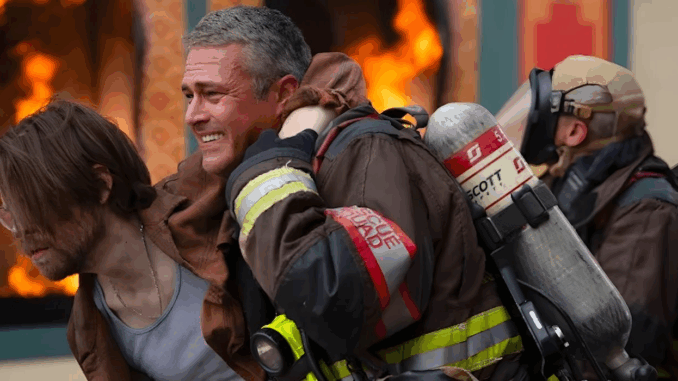
In the sprawling world of network television, few series pulse with as much heart and grit as NBC’s Chicago Fire. For more than a decade, audiences have rallied behind Firehouse 51, a found family forged in smoke, flames, and unbreakable loyalty. But Season 11 presented a narrative twist no scriptwriter could have fully planned for: the sudden, unexpected absence of Taylor Kinney, whose Lieutenant Kelly Severide has long been the fiery backbone of the show.
The news hit like a silent alarm. Severide wasn’t just another character — he was the daredevil spirit of Squad 3, a man defined by instinct, loyalty, and the scars of countless battles. His absence created not just a plot gap but an emotional void. Fans worried: how does Chicago Fire move forward without one of its most iconic figures?
Then came a headline that felt less like casting news and more like a lifeline: Jesse Spencer returning as Captain Matthew Casey.
A Return That Resonates
For longtime fans, Casey’s name carries weight. The calm, moral compass to Severide’s fiery unpredictability, Jesse Spencer’s Captain Matt Casey wasn’t just a character — he was a cornerstone. His departure in Season 10 left audiences gutted, a farewell that felt both natural and deeply personal. To hear that he would once again don the uniform wasn’t just thrilling; it was comforting, like seeing a familiar face walk back into the firehouse when it was needed most.

In many ways, Casey’s return amid Severide’s absence was poetic. The two men have always been opposite sides of the same coin — one measured, one instinctual; one steady, one combustible. Together, they embodied the brotherhood that defined Firehouse 51. And now, as one steps away, the other steps forward, carrying not just the fictional squad but also the real-world spirit of continuity for fans craving stability.
A Show About Family, On and Off Screen
What makes this moment so powerful is how it mirrors the very DNA of Chicago Fire. At its heart, the series has always been about family — not bound by blood, but forged in shared danger and sacrifice. When one member falters, another rises. When one is absent, another fills the space with unwavering loyalty.
Spencer’s return doesn’t just plug a gap; it reinforces the ethos that has made Chicago Fire endure for over a decade. It honors the past while anchoring the present, reminding viewers that even as life takes unexpected turns, the bonds at Firehouse 51 remain unshakable.
A Message to Fans
For viewers, the “exclusive” announcement wasn’t simply industry news. It was reassurance. It told them that even in moments of uncertainty — whether in real life or in fiction — the show knows how to protect its heart. Bringing back Casey wasn’t a stunt; it was a love letter to the fans who have stayed loyal through every loss, every cliffhanger, every hard goodbye.
Season 11, then, becomes more than just another chapter in the franchise. It becomes a study in resilience. Severide’s absence is deeply felt, but Casey’s homecoming ensures the firehouse remains whole. And in that, the series delivers one of its most powerful messages yet: the flames may change, but the fire never goes out.